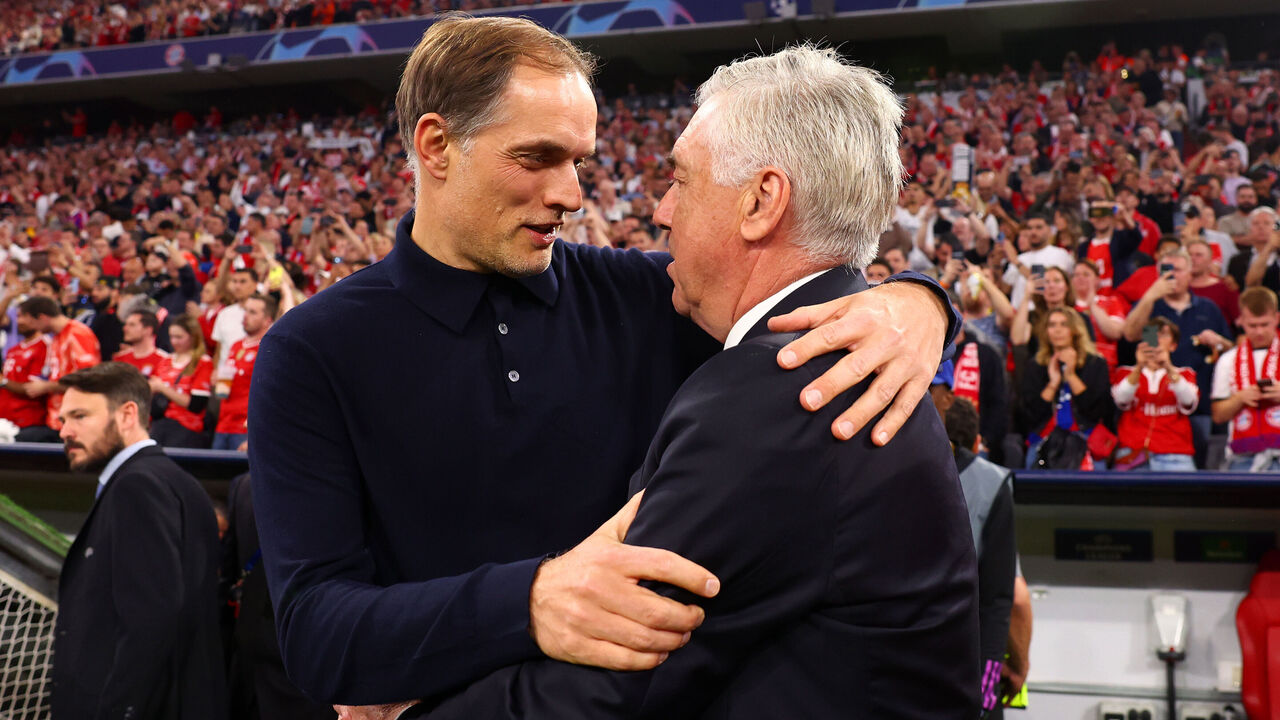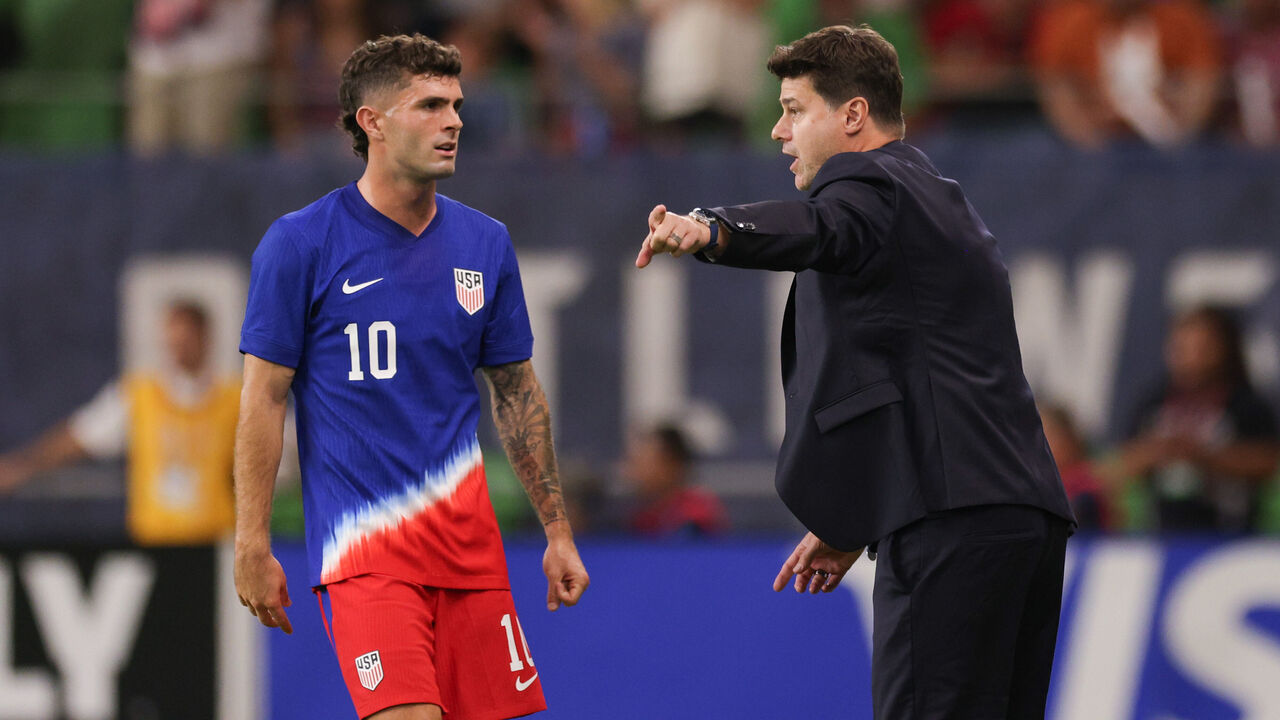World Cup teams enter super-coach era. There's little evidence it'll work
The 2026 World Cup is certainly extravagant. With 48 teams, it's the largest event in the competition's history. It'll stage 78 of its 104 matches in the United States - perhaps the most ostentatious country on the planet. Add the potential international farewells of two of the best players in the sport's history, Lionel Messi and Cristiano Ronaldo, and the inevitable gallery of Hollywood stars in the stands, and you've undoubtedly got the gaudiest World Cup in history.
So, it's fitting that the matches will be a battle royal between A-list coaches.
The U.S. men's national team is the responsibility of Mauricio Pochettino, a celebrated coach who won trophies with Paris Saint-Germain and led Tottenham Hotspur to a Champions League final. Jesse Marsch, the American in charge of Canada, isn't a preeminent figure by any means, but his reputation far outweighs those of his predecessors. Mexico and Iran, other teams assured of World Cup places, have entrusted high-profile veterans Javier Aguirre and Amir Ghalenoei with their men's teams.
But that barely scratches the surface.
Carlo Ancelotti, winner of a record five Champions League titles as a head coach, recently assumed control of Brazil - and despite exaggerated panic over the team's subpar performances, he guided the Selecao to World Cup qualification in his second match. Elsewhere in South America, Marcelo Bielsa is one of the most influential coaches in the game - Pep Guardiola is a longtime admirer of his ambitious and innovative methods - and he should take Uruguay to North America despite a recent downturn in results. Uruguay finished third at last year's Copa America.

Europe is awash with super-coaches. Trophy-hoarding tactician Thomas Tuchel is at the helm of England. Julian Nagelsmann, who has one of the biggest reputations among current coaches at just 37, is sculpting Germany's exciting attack. Didier Deschamps guided crisis-hit Juventus back to Serie A and lifted cups in France before moving into international football in 2012 and hoisting the World Cup with his homeland six years later. Portugal handler Roberto Martinez is clearly in a lower tier than Europe's most notable international bosses, but he unexpectedly won an FA Cup with Wigan Athletic and oversaw Belgium's best-ever World Cup finish in 2018.
Collectively, the aforementioned coaches have finished with the best record in top-tier leagues or conquered them via a playoff system on 25 occasions, won 33 domestic cups, tasted glory in 18 continental or global club competitions (with a charitable inclusion of Ancelotti's Intertoto Cup win with Juventus in 1999), and lifted trophies in five international tournaments.
Yet there's little evidence that this trophy-winning pedigree is a guarantee of success on the international stage.
Time at a premium
Taking over a national team appears to be an increasingly attractive proposition for decorated managers seeking relief from the intense club calendar. International football can also present unique challenges: Guardiola was rumored to be enticed by the challenge of winning the England men's team's first major trophy since 1966 before Tuchel jumped at the opportunity. And the colorful and fervent atmospheres at international fixtures are often more alluring than those in the European club game and certainly drown out the tired groans on social media each time domestic leagues pause for international windows.
But big names don't necessarily win prizes with national teams. Like many of his contemporaries, U.S. boss Pochettino built his reputation on tough training sessions, strong player-coach relationships earned through hard hours and in-depth tactical sessions, and the gradual development of youngsters with carefully controlled minutes and extremely attentive man management. International football doesn't afford coaches that time. Club matches are constant, while international games are sporadic and sometimes even expendable for players. USMNT captain Christian Pulisic, for example, is skipping this summer's Gold Cup to rest after a long season with AC Milan.
Pochettino, who hasn't always had his full complement of players available and will be forced to field an undermanned squad for the Gold Cup, has lost four straight matches with the U.S., including a humbling 4-0 defeat to Switzerland that showcased the team's limited depth.

The lack of time spent with players at training camps and on the pitch during matches isn't a natural environment for a domineering modern coach with detailed tactics and a keen eye on improving players. Even at the expanded 2026 World Cup, the road to glory is just eight matches. The need to deliver instant results on the biggest stages, with such a small sample of actual games, is in direct opposition to the concept of building a long-term project.
Many high-profile international coaches could benefit from taking a page out of Lionel Scaloni's book.
The fact that Scaloni isn't an imposing character worked in his favor. He didn't try to revolutionize Argentina's playing style in the few hours he had after taking the job. Initially, Scaloni's most transformative work seemed to be away from practice as he eased pressure on his players - namely Messi - and tempered fans' expectations.
"He's very calm, he's very laid back, he's very humble. His ego is miniscule," journalist Jonathan Wilson said in Copa90's "Once in a Lifetime" documentary on Argentina.
"And he had this mantra he kept repeating: 'We win, we lose - nobody dies, it's fine. People get too excited about football. It's only football.' And that, I think, is what Argentina needed."
Scaloni was never more than an assistant manager before the Argentine Football Federation appointed him as an affordable head coach of the men's team. He subsequently ended Argentina's 28-year Copa America drought in 2021, won the country's first World Cup in over 36 years in 2022, and enjoyed more Copa America success last summer.
Emerse Fae is a more extreme example of how training drills and coaching resumes matter less on the international stage. Fae's experience was limited to youth teams, Clermont Foot's reserve side, and assistant roles before he succeeded his boss, Jean-Louis Gasset, as Ivory Coast coach in January 2024. Fae inherited a team in disarray and faced a unique scenario: The Elephants were in the Africa Cup of Nations knockout rounds after limping through the group stage with one win and two defeats. Ivory Coast then won the tournament under Fae's watch, prevailing in the last 16 against Senegal, the quarterfinal meeting with Mali, and the final showdown with Nigeria despite conceding the first goal in each of those matches.
Scaloni and Fae's achievements can feel like miracles, but modest coaches winning huge tournaments are hardly isolated incidents in modern international football.
International soccer's titleholders
| Tournament | Coach | Previous major titles |
|---|---|---|
| World Cup | Lionel Scaloni (Argentina) | 1 |
| Copa America | Lionel Scaloni (Argentina) | 0* |
| European Championship | Luis de la Fuente (Spain) | 0 |
| Africa Cup of Nations | Emerse Fae (Ivory Coast) | 0 |
| Asian Cup | Tintin Marquez (Qatar) | 0 |
| OFC Nations Cup | Darren Bazeley (New Zealand) | 0 |
| CONCACAF Gold Cup | Jaime Lozano (Mexico) | 1 |
*Scaloni's inaugural Copa America triumph in 2021 was his first. Under his watch, Argentina defended its title in 2024.
Luis de la Fuente and Gareth Southgate, the respective bosses of Spain and England, had no senior trophies between them before their teams contested the Euro 2024 final in Berlin.
Based on numbers alone, the esteemed coaches who will man the World Cup dugouts are more likely to harm their reputations rather than furnish them. Nagelsmann and Luciano Spalletti were arguably the best coaches on paper before Euro 2024 kicked off. Nagelsmann's Germany exited in the quarterfinals. Spalletti, winner of three top-flight titles and five domestic cups as a coach, fell in the last 16 with Italy, and he was relieved of his duties this week after the Azzurri's 2026 World Cup qualification campaign opened with a harrowing 3-0 defeat to Norway.
The super-coach era is an admission of desperation. It's a clear sign that federations are trying to buy their way out of a trophy drought, wring the last drops out of a talented generation, or do anything they can to avoid embarrassment on home soil. And it's a surefire gamble when recent history suggests the morale of the players, and smartly dealing with pressure from supporters and the media, matter much more than the tactical blueprint of an A-list national team coach.
HEADLINES
- Report: Rivers to visit Colts, may come out of retirement
- Herbert active for MNF vs. Eagles days after hand surgery
- Winter meetings live analysis: Breaking down the biggest rumors
- Morris: Blank still '100% in support' despite Falcons' 4-9 record
- Hall of Fame chair 'not surprised' Bonds, Clemens were denied entry